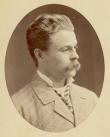The son of a prominent Bath (England) brewer, George Darrell first arrived in Australia around 1865 after having run away from home whilst in his teens. After a brief period of time in Melbourne he spent the next few years fossicking for gold in New Zealand before returning to Australia. It was during this time that he learned the art of engraving and performed in local amateur theatrical productions. Darrell's first theatrical success came through Mde. Fanny Simonsen who engaged him to sing secondary roles in grand opera. One such part was Prince Paul in The Grand Duchess. In 1869 he took on the juvenile lead opposite Walter Montgomery during the famous actor's Melbourne season. Around this time Darrell married Fanny Cathcart, the widow of actor Robert Heir, who had come to Australia in 1863 with Charles Kean. The union was to prove a successful one, both personally and professionally, and Darrell soon rose to prominence as a lead actor in his own right, and as a principal cast member for several overseas companies touring the country.
George Darrell's career as a dramatist began around the late 1860s/early 1870s. One of his earliest works was an adaptation of the drama Man and Wife (1871). In 1872 he became lessee and director of the old Victoria Theatre, and engaged a company of actors, among them George P. Carey and Maggie Oliver. He also toured throughout Australia presenting combinations of plays and musical entertainments, several of which were his own creations. Among these early works are the musical sketch The Darrell's at Home and a play with music Matrimonial Manoeuvres. Between 1872 and his retirement some thirty-five years later, George Darrell wrote and produced no less than 23 original plays and ten dramatisations of already existing stories. Interestingly, his early works (at least up to 1876) seldom attempted to tackle Australian subjects. Thus it was not until Transported for Life (1876), first staged in New Zealand some two years after Darrell had returned to the Antipodes from an American tour, that local characters and situations become pivotal to his narratives. His first season in Australia in 1877 (which followed the tour of New Zealand) also saw him present a revival of an earlier work, The Trump Card (1874). Darrell simply changed the narrative from America to Sydney (for the Sydney season) and to Melbourne (when he played there in 1880).
In 1878 Darrell produced Back from the Grave, a melodrama which had its plot based on spiritualism and was set almost entirely in England. This was followed in 1879 by the war melodrama The Forlorn Hope; Or, A Tale of Tomorrow. Margaret Williams suggests that this last work finally saw Darrell come into his own as an Australian playwright (Australia on the Popular Stage, p120). The Naked Truth, an emotional drama staged in 1883 with a small amount of musical performance, was followed that same year with his most acclaimed work The Sunny South. Regarded as one of the most important Australian plays of the late nineteenth century, it had long seasons in Melbourne and Sydney before touring throughout most of Australia. It was also produced in London in 1884 and later in America. Darrell is said to have played the role of Mat Morley at least 940 times. Among his more successful dramas were: The Squatter, which included the George Darrell/David Cope composition "The Passion Song Waltz" (1885); The Soggarth, a play with incidental music composed by Walter J. Rice (1886); another play The New Rush (1886); a dramatisation of Nat Gould's novel The Double Event (1893); and one of his final productions The Land of Gold (1907).
George Darrell's last appearance in public was in 1916 when, at age seventy-five, he 'declaimed with surprising spirit his own well-turned lyrics "Around the Dardanelles," and Tennyson's "The Charge of the Light Brigade,"' at the George Marlow-run Shakespeare Tercentenary Festival (Green Room Feb. 1921, 12). His last few years were spent at Roslyn Gardens (Sydney). On Thursday 27 January 1921 Darrell left a note in his room telling his friends he was going on a long voyage. The following day his body was washed up on Dee Why Beach on Sydney's north shore.
 6176271884987050940.jpg
6176271884987050940.jpg
 6176271884987050940.jpg
6176271884987050940.jpg